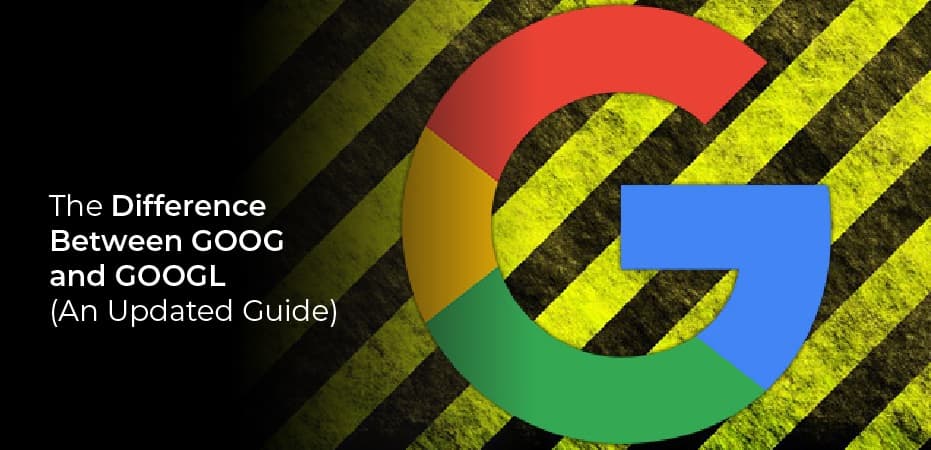If you’re in the market for Google shares, you’re probably wondering what the difference between GOOG and GOOGL is. Before you buy or sell, you should know about the three classes of Alphabet shares, which have different voting rights and price points. Hopefully, this information will make your investment decision a bit easier.
Note: Goog and Googl are the stock symbols of the Alphabet and are usually called Google.
Comparison Between GOOG vs. GOOGL
While there are similarities between GOOG and GOOGL, there are some key differences that you should know. The primary difference between the two companies is voting rights. The former shares have the right to vote in company elections, while the latter shares don’t. As a result, Class A shares may trade at a premium to Class C shares.
GOOG shares are class C shares. Investors who own these shares have no voting rights, so they sell them at a lower price than the stock price of GOOGL. The two companies have 349 million class C shares outstanding. In addition, Alphabet Inc. is facing more regulation of its core business.
Shares of both companies are available in the market, and each class has unique characteristics. The class A shares grant voting rights, while the class B shares do not. These differences may influence your decision. Whether you own class A or class C shares depends on your investment objectives and risk tolerance.
Goog Shares Have Voting Rights
Google shares are available in two different classes, Class A and Class B.
The A share is common stock and has voting rights for its holders, while the B share is reserved for company founders. The voting power of Class A shares is more limited than that of Class B shares. Investors who hold Class A shares can vote for policy changes and election of company directors. In contrast, those who hold Class B shares can only vote for the company’s executive committee and board of directors.
Google’s shares come in two flavors: Class A shares for outside investors and Class B shares for the company’s founders and other key figures. Owning a Class A share entitles one vote while owning a Class B share entitles you to 10 votes. The founders and former CEO Eric Schmidt hold most of the class B stock.
· Alphabet Share 10 Votes: GOOG & GOOGL
Alphabet is a publicly traded company with stock ticker symbols GOOGL and GOOG. Each Alphabet share has 10 votes, although it is worth noting that most GOOGL and GOOG shares are held by people who are not insiders. As a result, most shareholders do not have any say in company management. In the long term, both share classes will likely trade in tandem. The Class A shares have under 300 million votes, while the Class B shares have 465.4 million votes. In the end, Alphabet will likely continue to go the way it has been.
GOOG Shares Are Trading at A Premium
If you’re interested in buying Google stock, it’s important to understand its underlying structure. The company’s shares are categorized into two classes: Class A shares, which are known as common shares, and Class C shares, which have no voting rights. The former trades at a premium to Class C shares, typically at a discount. While these two types of shares are similar in structure, the distinction is important.
Google’s stock has been under pressure for several years. The company has been hit by several major lawsuits, including one that alleges antitrust violations. In June, Alphabet failed to meet expectations in terms of revenue and earnings. The company also missed expectations for its core digital advertising business.
If you want to purchase a share of GOOG but cannot afford the company’s current valuation, consider buying a portion of the stock. Although it is expensive, GOOG is a better investment for most people than GOOGL. You’ll be able to get tax benefits from a taxable brokerage account, while GOOGL will allow you to build wealth for near-term goals. Just remember to plan how much to invest in Google before purchasing.
Alphabet’s Buyback Program Affects Supply-Demand Fundamentals
Alphabet’s buyback program makes financial sense, but the stock price should not be paying a premium for non-voting shares. If investors are bullish on Alphabet, voting shares are still a better buy. Over the next few years, the company plans to repurchase at least $50 billion of its shares, and its cash and equivalents have decreased by less than $1 billion.
Investors often prefer these programs over other forms of investment, as they boost company earnings. However, some investors may question whether this buyback program is helping Alphabet stock’s fundamentals. Analysts at Bank of America said the program’s recent increase in share repurchases isn’t indicative of a change in the company’s financial priorities. Alphabet is committed to long-term growth and also supports acquisitions.
Several large technology companies have implemented repurchase plans to bolster stock prices. Alphabet’s $50 billion buyback plan followed a previous $28 billion deal in July. The buyback program will eventually retire over 11 million shares of Alphabet stock.
Relative Strength Rating of Alphabet
This time the stock of Alphabet is entering into a new process, and it’s up from 79 to 82, a score that indicates that Alphabet has held up remarkably well during a period of a stock market correction and inflation. Relative price strength is an important indicator to watch for growth stocks. The Relative Strength Index (RSI) is a proprietary calculation by IBD that compares a stock’s price movement over the past 52 weeks. Stocks with the highest RS Ratings typically enter their runs with an RSI above 80.
Alphabet’s value is determined by investors based on its earnings, sales, fundamental and technical indicators, and analyst projections. The amount of money determines the price of Alphabet that investors are willing to spend on the stock. In other words, the price represents what buyers and sellers are willing to pay for it on the open market.
To calculate Alphabet’s RSR, you’ll need to compare the company’s financial data against its competitors. This comparative analysis will provide quantitative and qualitative information useful for investment decisions. Once you’ve done this, you’ll be able to compare Alphabet’s price with other similar companies.
Conclusion on GOOG & GOOGL
GOOG stocks have been performing better than GOOGLShares in recent years. While the profits for both share stocks will eventually equalize, GOOG shares are more likely to be worth your time. If you want better returns for your money and don’t mind having little voting power, GOOG shares are likely to be a better choice.
If you’re interested in buying Google stock, the good news is that it’s still a great time to buy. Its Relative Strength Rating (RS) is 33, among the best in the market. Its Accumulation/Distribution Rating (ADX) is also high, which is better than the average for technology stocks. Another positive factor is that Google’s stock has a split that could allow it to join the Dow Jones Industrial Average. That would make it more attractive to retail investors.



